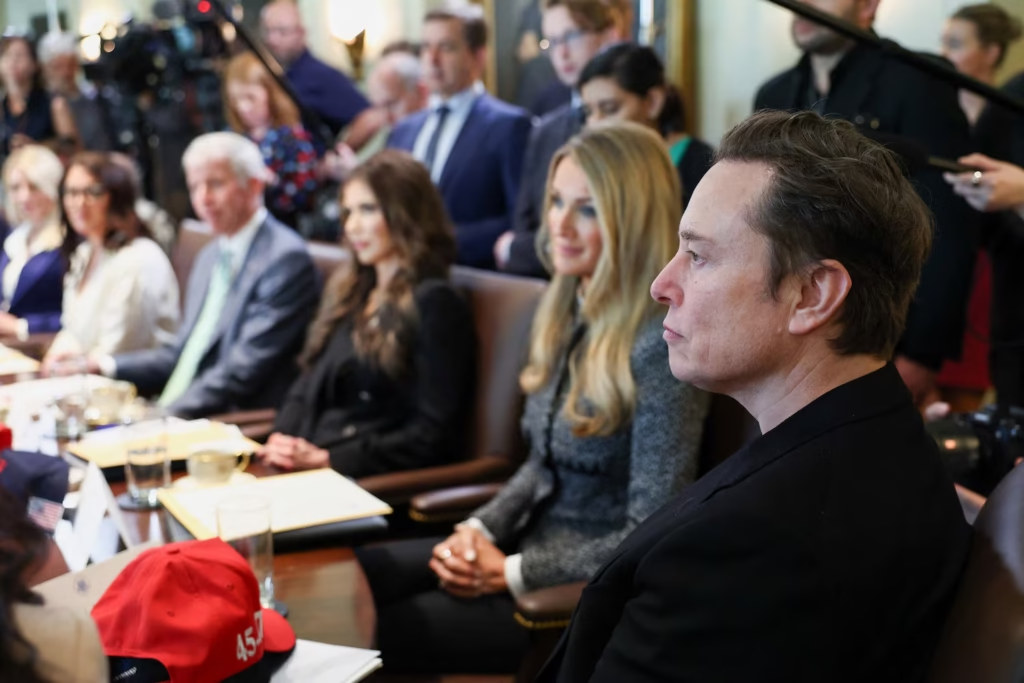On Wednesday, April 30, 2025, Elon Musk addressed reporters at the White House in Washington, D.C., speaking candidly about his first 100 days leading the Department of Government Efficiency (DOGE). The Tesla CEO, who has brought his innovative mindset and business acumen to government service, shared his reflections on the challenges and progress his team has made in this new role, as well as the roadblocks that have prevented him from fully achieving his ambitious goals. Musk’s comments came during a meeting with President Donald Trump and his DOGE team, which includes key lieutenants Steve Davis and Antonio Gracias, who have been working alongside Musk to drive reform in the federal government.
Musk, known for his transformative impact in the private sector, including revolutionizing the electric car industry with Tesla and advancing space exploration with SpaceX, was asked by reporters about the state of the department and his progress in its first 100 days. While he expressed pride in his team’s work and acknowledged that progress had been made, Musk was candid in his assessment, admitting that DOGE’s effectiveness had not been up to his high standards.
Musk’s first 100 days in charge of DOGE were nothing short of intense, he said. When asked how he felt about the department’s accomplishments, Musk replied, “I think we’ve been effective, not as effective as I’d like, I think we could be more effective, but we made progress.” For a man who thrives on disruption and innovation, Musk’s comments reflected the frustrating reality of navigating the complexities of the federal bureaucracy.
“I think we’ve made some significant strides, but you always want to do more,” Musk continued, describing the high level of intensity involved in managing a department tasked with rethinking how the U.S. government operates. Despite his frustration with the pace of progress, Musk expressed determination to push forward, acknowledging that his ambitious vision for cost-cutting and efficiency could be realized with more support and a shift in governmental priorities.
The $1 Trillion Goal
One of the most ambitious goals Musk set out for DOGE was to cut $1 trillion from the federal budget, a monumental task that would require dramatic changes in spending patterns and deep structural reforms across various government agencies. Musk, who is no stranger to setting and achieving audacious goals, was asked repeatedly by reporters whether he still believed this $1 trillion target was achievable.
Despite acknowledging the difficulty of reaching such a massive target, Musk maintained that it was possible. “I think it’s possible to do that, but there’s that. It’s a long road to go, and, you know, this, this, this really, it’s really difficult,” Musk said. He pointed to the department’s current savings rate of $1.6 billion a day as evidence of the progress being made, but emphasized that the journey ahead would be fraught with challenges. “Our rate of savings per day is pretty good. You know, we’re like $1.6 billion a day, 100 days in.”
Musk’s comments reflect the pressure and the scale of the task at hand. The $1 trillion target represents not only a historic achievement in fiscal responsibility but also a political challenge of monumental proportions. Musk, who has a reputation for pushing boundaries, understands that achieving this goal will require overcoming entrenched interests within Washington, D.C., which have historically been resistant to such dramatic cuts.
Bureaucratic Obstacles and Resistance
When pressed about the obstacles that have made his goal of $1 trillion in savings so difficult, Musk pointed to the long-standing resistance from what he referred to as an “entrenched set of interests” within the federal bureaucracy. He emphasized the challenges of trying to change a system that has been built around incremental increases in spending year after year. “The default of the federal bureaucracy is spend what you did last year plus 5% indefinitely,” Musk said. “So in order to change that, it’s like changing the direction of a fleet of supertankers.”
For Musk, the roadblocks are not just administrative but deeply political. He explained that the resistance from various interest groups in Washington, including bureaucrats, lobbyists, and lawmakers, who have a vested interest in maintaining the status quo, has made it even more challenging to implement his vision. Despite these obstacles, Musk remains resolute in his belief that change is possible, stating, “We are making as much progress as we can… There’s a lot of inertia in the government… So it’s not easy. This is a way to make a lot of enemies and not that many friends.”
The bureaucratic inertia that Musk speaks of is a significant hurdle in his drive for reform. With so many entrenched interests and systems of governance resistant to change, it remains to be seen whether Musk’s approach—focused on efficiency, cost-cutting, and innovative problem-solving—can gain the necessary political traction.
Support and Political Will
While Musk expressed frustration with the pace of progress, he also acknowledged the importance of political will in making his goals a reality. “Is there a sufficient political will in Congress and elsewhere to actually do that?” Musk asked rhetorically, acknowledging that the success of his mission would depend on whether lawmakers and other political actors could rally behind the idea of major budgetary reform. “It remains to be seen. If we can do it, we will.”
The success of DOGE’s mission ultimately hinges on whether enough political support can be garnered to support Musk’s cost-cutting initiatives. Musk’s assertion that “if we can do it, we will” underscores his determination, but also his awareness that the road ahead will require more than just technical expertise and efficiency—it will require consensus-building, negotiation, and strategic alliances.
The Role of the Cabinet and Congress
Musk’s comments also shed light on the broader political context in which DOGE operates. He highlighted that the cabinet and Congress, whose support is essential for implementing his reforms, would play a pivotal role in determining the success or failure of the mission. “How much pain is, you know, the cabinet and Congress going only to take,” Musk mused, acknowledging that the political cost of reducing government spending by such a large amount could be a significant barrier.
Musk’s comments reflect a keen understanding of the political realities of Washington, D.C., where even the most well-intentioned reforms often face resistance from those who fear the consequences of major cuts. Nevertheless, Musk’s reputation as a disruptor and his track record of achieving ambitious goals may give him the leverage needed to push his vision forward.
The Future of DOGE and Its Impact
As DOGE’s first 100 days draw to a close, Musk’s comments reveal both optimism and realism about the future of the department. He remains committed to his goal of reducing government waste and inefficiency, but he also recognizes that the path forward will not be easy. The question remains whether the political will in Washington, D.C., can match the urgency of Musk’s vision.
For Musk, the fight for a more efficient government is not just about cutting costs—it is about making the government work better for the people it serves. While his tenure at DOGE has had its challenges, Musk’s drive to bring about meaningful change in the federal government remains unwavering. As he continues to work with his team and political allies, it remains to be seen whether the ambitious goals he has set can be realized, but for now, he remains confident that the mission is worth the struggle.
In the end, Musk’s first 100 days at DOGE have been marked by both progress and setbacks, but his determination to lead the charge for government efficiency remains steadfast. As he continues to confront the challenges ahead, one thing is clear—Elon Musk’s time in Washington is only just beginning, and the full extent of his impact on the federal bureaucracy has yet to be realized.

